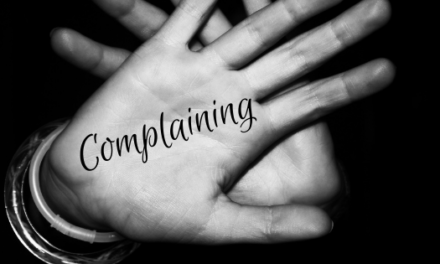Possessing “think skin” is an ability to keep from getting upset or offended by the things other people say and do, especially when those responses involve criticism. Thick skin is a tremendous benefit for both personal and professional growth. If you are working to grow and improve important aspects of your life it is a certainty that risks, mistakes, failures, and differences of opinions will accompany your journey. Do you find yourself worrying about what other people think of you and your actions? Are you afraid to take on a new opportunity due to the ridicule it may involve? Are you easily angered, emotionally hurt, or defensive when your idea is challenged, or in situations when you don’t get your way? Criticism is a fact of life, both merited and unmerited. Wouldn’t it be great if you could hear criticism on a daily basis, simply brush it off, learn from constructive feedback, and move forward with passion and enthusiasm? Imagine what you would accomplish if you had thicker skin.
Instead of living your life constantly offended, what if you could focus your energy and actions towards productivity? While some people are born with a thick-skinned personality, most of us must learn how to develop one over time.
Criticism often appears in four forms.
- Insults: Insults are defined as speaking or treating someone with disrespect or scornful abuse. These are personal attacks based on emotions as opposed to reasoning.
- Constructive feedback: Constructive feedback are suggestions that are presented with sincerity and an intention to help create improvement.
- Negative criticism: Negative feedback are responses that are presented in spite, anger, pettiness, or with the intention to highlight something is wrong without offering realistic solutions.
- Disregard: Disregard is the action or state of ignoring something. These are implied criticisms that appear when a request is ignored or not answered.
Criticism is as likely as the rising sun each day. Here are 10 tips on how to develop thick skin to deal with all forms of criticism.
- Stop taking criticism personally: You can control your emotions. How you respond to criticism is your choice. When criticized, ask yourself, “Is the criticism true or false?” If false, let it go and focus on moving forward without thinking of it again. If true, embrace it, and take action to improve. You are not perfect and learning from criticism is a powerful tool for growth if you choose to except it. Criticism helps highlight your blind spots, and, if you do not take it personally and choose to learn, it can provide your life with tremendous benefit.
- Embrace extreme ownership: Stop making excuses. When you make a mistake, speak up and own your mistake. Never make an excuse or blame others. Instead, state what you learned and share how you will use the lesson to improve. Most importantly, do it.
- Stop negative self-talk: There is a war raging inside your head and it is between you and you. You are your worst critic, and you are often the first person to tell yourself why you are insignificant, uncapable, and weak. Replace weak thoughts with strong thoughts. When you start to think negatively, kill the negative thought. Replace it with a positive thought that counteracts the negativity. “I can’t,” is easily replaced with “I can.” In the same manner, reframe the sting of criticism with the excitement of improvement.
- Ignore anyone on the sidelines: You must decisively eliminate the opinions of people who have no credibility to provide valid opinions or helpful feedback. If they don’t matter, they don’t matter.
- Accept not everyone is not supposed to like you: You are unique. So is everyone else. You have beliefs, opinions, mannerisms, interests, personality traits, and habits. There are certain people that you like and enjoy spending your time, and there are people you dislike and do not enjoy spending your time. Other people feel the same way about you. Strive to live your life with good character, respect others, and work to live your life by a high moral code focused on love and service. If you do this, you should not feel offended when someone does not like you. Instead, you understand they do not stand for the important items you stand for in your life, and their favor of you, or lack thereof, is insignificant.
- Embrace confrontation with curiosity and candor: Instead of approaching disagreements with fear, anger, jealously, or frustration, choose curiosity and candor. The goal of confrontation should not focus on a verbal or physical fight, but instead, the sincere search for alignment. Use curiosity to focus on asking questions to understand the facts behind the disagreement, which very well may solve the confrontation. Use candor to focus on honest conversation and expression of your interest in presenting your beliefs while equally seeking to understand where the other person is coming from in their argument. If you lose your temper, you have lost your argument. Not all confrontation ends with both sides agreeing. Sometimes you must agree to disagree. However, you are much more likely to have your position understood if you genuinely seek to understand the position of the other person. You are much more likely to influence their beliefs or position if they feel respected and not attacked.
- Identify your vulnerable areas and triggers: What are the triggers that cause your temper to explode or your feelings to become hurt? Understanding your triggers allows you to prepare to recognize these situations in advance. Is it when you feel disrespected, scared, hurt, or misunderstood? What are the alternative ways you can respond to these scenarios when your triggers appear? You can then rehearse alternative responses that are controlled, calm, and rational. Preparation equals separation, and practice makes perfect.
- Be driven by your goals: When you have goals set that you feel immense passion to actively pursue and achieve, your mental focus will grow in strength and your worry about the opinions of others will drastically shrink. Have you taken the time to truly identify and pursue the right goals for your life?
- Create a positive mindset: Read the blog, https://www.livetpg.com/how-to-change-the-way-you-think/
- Memorize a great quote that inspires you: It is not the critic who counts; not the man who points out how the strong man stumbles, or where the doer of deeds could have done them better. The credit belongs to the man who is actually in the arena, whose face is marred by dust and sweat and blood; who strives valiantly; who errs, who comes short again and again, because there is no effort without error and shortcoming; but who does actually strive to do the deeds; who knows great enthusiasms, the great devotions; who spends himself in a worthy cause; who at the best knows in the end the triumph of high achievement, and who at the worst, if he fails, at least fails while daring greatly, so that his place shall never be with those cold and timid souls who neither know victory nor defeat. – Theodore Roosevelt





